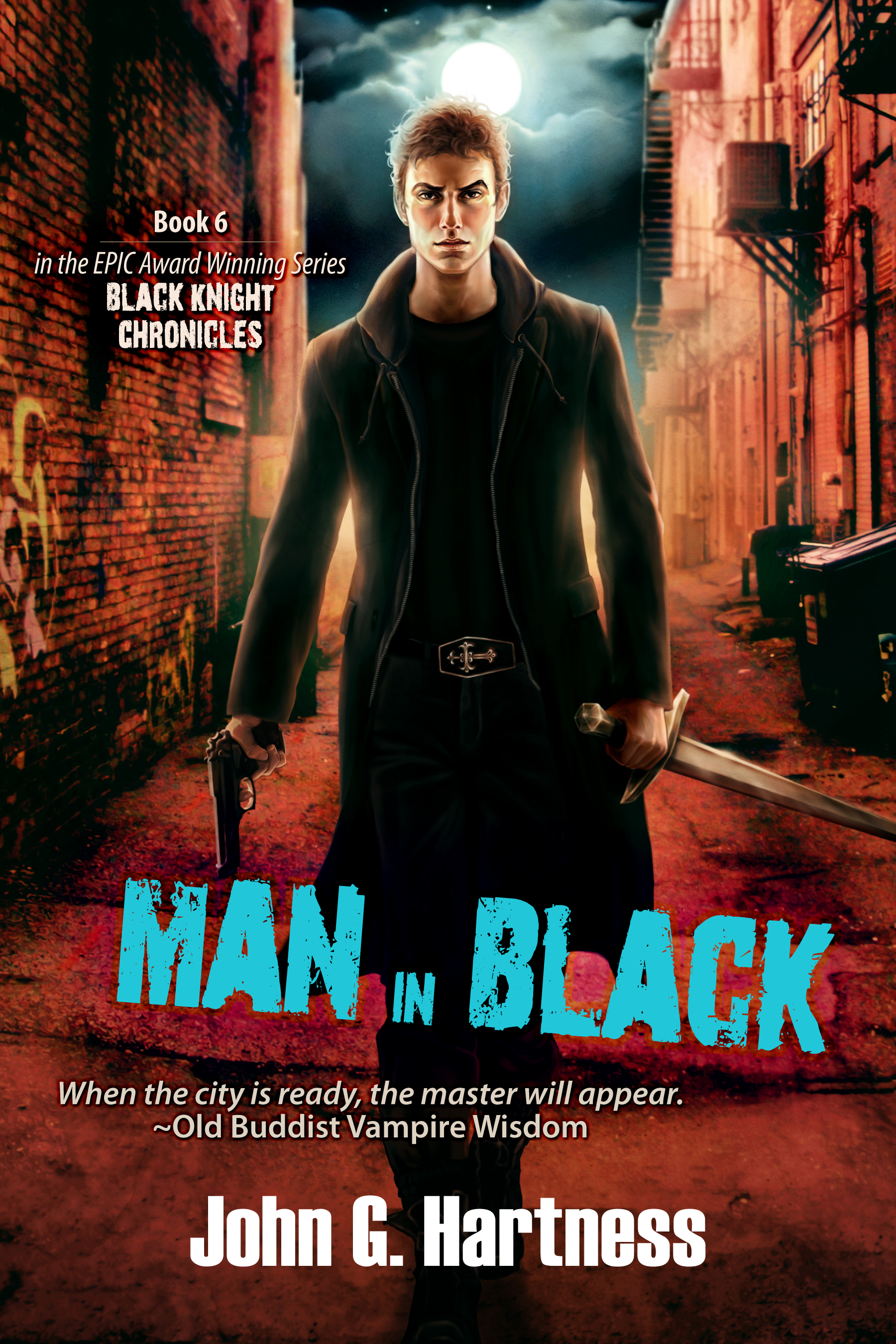
by john | Aug 15, 2016 | Business of publishing, Writing
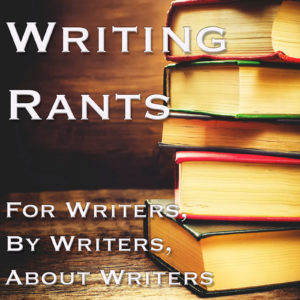 Part 1 of this post got a lot of traffic, generated a fair amount of Facebook discussion, pissed some people off, and hopefully was useful to some of you. It also spawned my new podcast, Writing Rants, which is coming soon right to this here web space.
Part 1 of this post got a lot of traffic, generated a fair amount of Facebook discussion, pissed some people off, and hopefully was useful to some of you. It also spawned my new podcast, Writing Rants, which is coming soon right to this here web space.
I do want to clarify one thing about these two posts – if you are a multi-published author, most of this isn’t going to apply to you. If you have been working in the business for a while, you get to use adverbs, you get to start a story in the wrong place (#2 on the list – spoiler alert) and you sometimes get to use passive voice. Because you have been working in the field long enough to know how to do those things. Presumably.
But at least you have enough equity built up with editors through your publication history that we (I) are willing to give you a shot. If I know you, if we’ve met at a con and shared a table together, you get a lot more leeway than someone who I know nothing about. If your query letter comes in with a list of half a dozen published novels or a dozen or so published short stories, then I assume that if it starts off oddly, you know what you’re doing, and I’ll give you a little more time than someone who has no credits.
That’s not fair. I know. I also know that it isn’t fair I got cut from my Little League team. Bullshit. It’s totally fair, and it’s fine. I got cut from the team because I was too green and not athletic enough. Why did your story get rejected? Well, let’s continue on to the top two reasons I reject a submission.
#2 – Your story starts in the wrong place – I see this taking two forms. In the first, there are certain beginnings that cliché, or at least cliché for certain genres, and I just don’t want to see them. Here are a few things to avoid when submitting –
- Starting off in a dream – Don’t do it. It’s trite, it’s over done, and very seldom done well. Particularly avoid being clever and tricking the audience into thinking that what’s happening in the dream is actually part of the narrative, then jumping out of the metaphorical closet and yelling “GOTCHA!” it doesn’t make you a clever writer, it makes you a douche. And it makes you unreliable to the readers. Remember that every word you put onto the page is part of your contract with the readers, and if they don’t trust you, they will not be invested in the story.
- Getting up in the morning – Reading about someone getting ready for school or work isn’t interesting. We all get ready for school or work every day. Unless there’s something reaching through the mirror while your protagonist is shaving, don’t tell me they shave. Start in the action.
- Starting away from the protagonist – Unless you’re writing a thriller, and you’re starting the book with the Terrible Thing being performed by the villain, and we’re going to return tot he villain’s POV every once in a while throughout the book, Don’t start the book anywhere but focused on the protagonist. You have limited time to introduce the main character and get the audience to love her. Because they downloaded the first 10% for free on their Kindle, and if you don’t hook them in the sample, you won’t get them to buy the rest of the book. I know I download a LOT of samples, and I buy very few of the books I sample. If you want an example of a book that hooks you from the jump and almost forces you to buy it once you read the sample, try Alice
 by Christina Henry. It’s a helluva book and hooked me from the beginning.
by Christina Henry. It’s a helluva book and hooked me from the beginning.
Of Lips and Tongue by AG Carpenter is one that didn’t just hook me from the beginning of the book, it hooked me from the first line of the query letter. “Delaney Green is one of them that don’t burn.” It puts me into the world of the story in one line. I know that it’s Southern. I know that it’s supernatural. I know that supernatural things are somewhat accepted. I know that the character is locked askance at because of her abilities. I got all that from the first sentence of the query letter. I bought the novella, and two more.
In the second, the story just doesn’t do anything in the beginning. Sometimes an author spends too much time setting things up and introducing characters, and not enough time moving the action along and hooking a reader. Remember that I am a genre fiction reader, I’m a genre fiction publisher, and a genre fiction writer. We are not working in the literary fiction world, we are writing potboilers and page-turners. Shit has to happen. And it has to happen from the beginning. It’s not necessary that there be a fight scene on Page 1, but it’s also not bad.
With my book Genesis, the first draft of the book was awful. I started the book 100% in the wrong place. The premise of the movie is Red Dawn meets X-Men: First Class. An EMP destroys the world’s technology, and without the interference of all the tech, people are able to harness the elemental magic of the earth again. This ability only manifests itself in teenagers and people who are more open to change and magic (hippies). I started the book with the protagonist getting ready for school. Then I realized that no one gives a shit about that. so I started the book at the point where the EMP has hit and she and her brother are hauling ass out of the school. The book works much better when it starts in the right place.
By the way, Genesis has recently been uploaded for audiobook, so that will be available soon!
And I’m almost at my thousand word limit, so you’ll have to wait a little while to find out The #1 Reason Why I Rejected Your Manuscript.
And now time for a little shameless self-promotion –
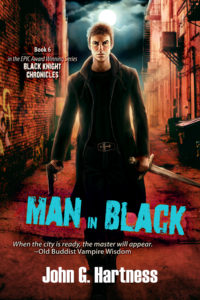 Black Knight Chronicles #6 – Man in Black
Black Knight Chronicles #6 – Man in Black releases today! It’s my book birthday, and yesterday was my birth birthday! So if you want to show the love, go buy the book! If you don’t have $6 to buy Man in Black, check out one of my other books. The Black Knight Chronicles Omnibus
releases today! It’s my book birthday, and yesterday was my birth birthday! So if you want to show the love, go buy the book! If you don’t have $6 to buy Man in Black, check out one of my other books. The Black Knight Chronicles Omnibus , collecting books 1-3, is on sale for $2.99.
, collecting books 1-3, is on sale for $2.99.
And if you have Kindle Unlimited, you can read most of my other work for free! For just $9.99 per month, you can read every Bubba the Monster Hunter story, every Quincy Harker story, and a ton of my other work as often as you like! And right now you can try KU for free for 30 days. Just click Join Amazon Kindle Unlimited 30-Day Free Trial.
If you like these blog posts, and want to see more of them, you can head over to my Patreon and pledge your support. I’ve changed my rewards around a bit, and there are some improved perks at different patron levels, so go check it out and fund my convention travel budget.


by john | Aug 5, 2016 | Appearances, Business of publishing, Writing
Since opening up Falstaff Books, I’ve been dealing with more submissions than ever. This is awesome, because submissions, particularly unsolicited submissions (or “slush”) is how we build anthologies and a catalog. I, just like every editor and publisher I know, am excited every time I open a query letter and start to read the attachment. I want to find the next amazing book or story, because if I publish it, not only do I get to help bring an amazing book to life, but we all get paid. Remember, a reputable publisher doesn’t make any money unless you make money. Unfortunately, most of what comes in on submission gets rejected, and I want to touch on some of my personal top reasons that your story or novel gets rejected. Some of these are pet peeves, and in a world where my time is incredibly limited, it only takes hitting one hot button to get your book or story rejected. So here, in reverse order, are John’s (and John’s alone) Top 5 Reasons I Will Reject Your Book or Story. I’ll bring you Part 2 next week, because this is running long.
5) Bad Timing – sometimes you honestly just get screwed, and you submit a story or novel (for here on out, I’m just going to call them books) that is too similar to something we just acquired, or too much like something else on the market. For example, if you have a great idea for an urban fantasy series about a male wizard for hire in Indianapolis named Barry Teasden who has a spirit trapped inside a gargoyle on his desk, I’m probably going to pass. Frankly, if you have any kind of urban fantasy detective story, I’m probably going to pass unless it’s 100% goddamn amazing, and there’s something to set it apart from any of the dozens of urban fantasy detective series out there. Including the ones written by the publisher.
But a lot of times you can’t know that we’ve just bought a story in the same genre as yours, or have something on the docket that hits many of the same check marks. For example, it would be hard to know that we aren’t the place to send your “changeling travels to Fairy in search of her absentee parent – hilarity does not ensue” novel, because Changeling’s Fall hasn’t released yet. But it will come out late summer/early fall, and it is the first in a series of four novels about that set of characters. So that’s great for us, because it’s an amazing book, but it’s not great for writers of similar books, because that market is now closed to them.
4) Didn’t Follow the Guidelines – When I worked in the lighting business, I was a middle manager. I had a dozen people that reported to me, and I was responsible for hiring and firing them. One thing I was always looking for in people was a college degree. Not that I thought you needed a degree to do the job, because you certainly don’t. But because having a degree was a shortcut to show an employer that you are capable of sticking with one task for a long time and completing it. Submission guidelines are the same thing.
What am I saying? I’m saying that I’m perfectly capable of quickly reformatting your submission into the typeface, font size, and spacing that is easiest for me to read. Take me less than a minute. And that’s not the point. The point is – are you someone who pays attention to detail, or are you a pain the ass? Do you understand that this is a business relationship, and as such there are ways to do things and ways not to do things, or are you a special friggin’ snowflake that I’m going to have to remind to do everything and hound about missed deadlines?
Submission guidelines are a test, like Van Halen’s green M&Ms. The band never gave a single shit about the color of the M&Ms, but a venue that took the time to either adjust the tour rider to take out the stupid line about the green M&Ms, or took the time to pick out the green M&Ms, was a venue that was paying attention to details. And that’s a venue that’s probably going to have the right safety equipment, the right number of backstage passes for family and guests, and won’t have food in catering that the band is allergic to. A writer who follows the submission guidelines to the letter is probably a writer that will respond to edits quickly and succinctly, will get their shit turned in on time, and generally will behave like a professional.
So follow the goddamn guidelines.
3) Book or Story needs work – Nobody’s first draft is worth a damn. Not mine, not yours, not Neil friggin’ Gaiman’s. So polish your work before you send it out for someone to potentially purchase. Have someone help you polish it. There are critique groups everywhere in the world, including online critique groups for people who live in rural areas and don’t have enough people close by. Use one.
Note – I am not suggesting that you pay an editor to polish a book that you want to sell to a publisher. That’s what we do. It’s our job to handle that level of editorial. But I am saying make friends with writers who are where you are in your career, and work together so that all of you get better. Having someone to put fresh eyeballs on your work will help with things like homonyms and words that either aren’t spelled like you think they’re spelled or words that do not mean what you think they mean.
Here are a few things that will kill the submission before it really gets going. Remember, these are things I don’t care for, but they aren’t universal. They’re pretty close, though. Eliminate these things from your storytelling and it will help you make more money as a writer.
Passive Voice – People need to do things, not have things done to them. Brutus needs to stab Caesar, we don’t need to hear that Caesar was stabbed by Brutus. If your POV character keeps having things done to her, then maybe she shouldn’t be your POV character. Or maybe you should write from a closer POV, so we can understand her reaction to these things better. But get rid of passive voice.
“To Be” – It’s really not to be. The more instances of “was, were, are” you can eliminate from your writing, the more immediate you can make it. Use strong, active verbs to tell the reader what’s going on in the scene. I wasn’t standing by the bar watching the room, I stood by the bar watching the room. I am not sitting at my desk writing a blog post, I sit at my desk writing a blog post. The various conjugations of “to be” distance the reader from the action and reduce the immersion of the character into their surroundings. It blunts the edges of your writing, makes it dull.
Adverbs – You get one per every 50,000 words. You can have them back when you’ve published a million words of fiction. Don’t argue with me, just cut out the annoyingly ever-present and ridiculously repetitive adverbs.
That’s enough for Part 1. I’ll come back next week with the next two pieces of the puzzle – Your Story Starts in the Wrong Place, and You Aren’t a Good Enough Writer (Yet). I figure if these didn’t piss everybody off, those certainly will!
If you loved this, hated it, or just want to meet me live and in person, come say hi at the Charlotte Comicon, this Sunday, August 7, from 10AM – 5PM at the Embassy Suites in Concord, NC. More information here.
If you love my work and these blog posts and want to keep me writing, feel free to visit my Patreon page. I give away all sorts of free stuff to my patrons, including autographed books from my collection, free audiobooks, and free ebooks.
Black Knight #6, Man In Black, is available August 15th, just after my birthday! You can pre-order it now!

by john | Aug 1, 2016 | Appearances, Promos/Giveaways, Writing
Hey folks – I know there are a few people who aren’t on my mailing list that sometimes pop by here, so I wanted to give everybody an update on what’s going on and where I will be.
BTW, why aren’t you on my mailing list? Sign up here and you’ll get a free book!
So, new stuff. Here we go. On July 29, I released Heaven Sent, book #5 of the Quincy Harker, Demon Hunter series.
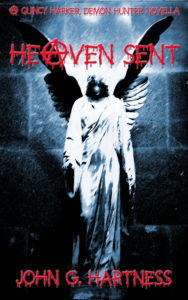
In Heaven Sent, we travel back to 2009 to see the first meeting between Harker and Glory, his guardian angel. She shows up at a crime scene where he is looking into the death of a prominent Charlotte attorney. The lawyer is found in a mall parking lot in the middle of the night, and his body has been drained of most of its blood. Not vampires, this time, the huge slash across the dead man’s throat makes that clear. So why is Harker involved?
To the naked eye, there’s no reason. But when Harker looks over the crime scene with his Second Sight, he sees something strange about the man. Wings. The dead man has a pair of golden ephemeral wings sprouting from his back. The dead man is a Nephilim, a half-human, half-angel hybrid that can walk among the mundane world without anyone ever being the wiser.
Now he’s dead, and he’s not the first one. Quincy Harker has to find out who is murdering angels in the Queen City, and why. Then he has to stop them. Good thing his backup on this case was Heaven Sent.
Heaven Sent is available exclusively on Amazon, as part of it’s Kindle Unlimited service.
I promise, I’ll get into why I went back to KDP Select, making many of my titles available free to Kindle Unlimited subscribers, in another post. Maybe here, maybe on Magical Words.
Coming Soon – Man in Black – Black Knight Chronicles #6

The latest installment of the award-winning Black Knight Chronicles series finds Jimmy Black in more trouble than he’s ever been. He took care of one threat in the last book, In the Still of the Knight, but now he has to deal with all the fallout of the choices he made there.
He’s the new Master of the City, a supernatural crime lord who only ever wanted to be a superhero. He’s been called in by the police to help on a case where he just wants to bite everybody instead of working with them. He just found out that there’s a mysterious Vampire Council, that they’re watching him, and if he screws up – they’ll kill him.
And on top of all that, he’s having serious girlfriend issues.
And oh, yeah, then there’s Lilith…
Man in Black will be available everywhere books are sold August 15th!
Google
Amazon
Kobo
Coming in August – Queen of Kats Part 2 – Survival
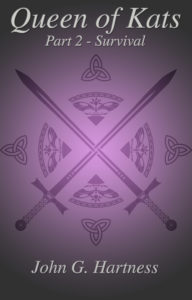
Once upon a time, there was a thief named Remarin. He was a very good thief, if a it lacking in impulse control. Remarin was hired to steal something because, well, thief. He stole the thing, but his fence double-crossed him. Because, well, thief. So Remarin killed the fence and ran off with an urchin boy he found hiding in the back room of his fence’s shop.
Except the urchin wasn’t an urchin.
And the urchin wasn’t a boy.
She was a girl, her name was Kit, and her uncle murdered her father and took her throne. It was all very much like Hamlet, except without the iambic pentameter.
So Remarin traveled through the lands with the disguised princess, finally settling in one spot for just long enough to get comfortable.
Until someone from Remain’s home finds him. It seems Kit isn’t the only one living a life under false pretenses. And now Remain’s past has caught up to him. The thief has to confront his real identity to save his brother’s life in Queen of Kats Part 2 – Survival.
Queen of Kats will be exclusive to Amazon, but you can get it, and all my new releases, early just by becoming a patron! With Patreon, you choose the pledge, and the rewards. Get free stories, ebooks, and previews! Click here to become a Patron!
Coming sometime in September will be a new Bubba novella. More on that as it finishes.
Where to find me
As convention season winds down, I’ve got a few more appearances on the docket this month and next.
8/7 – Charlotte Comicon
8/13 – Clover Community Con
8/27-8/28 – Soda City Comiccon – Columbia, SC
9/2-9/5 – Dragon Con – Atlanta, GA
I hope to see y’all at one or more of these events!
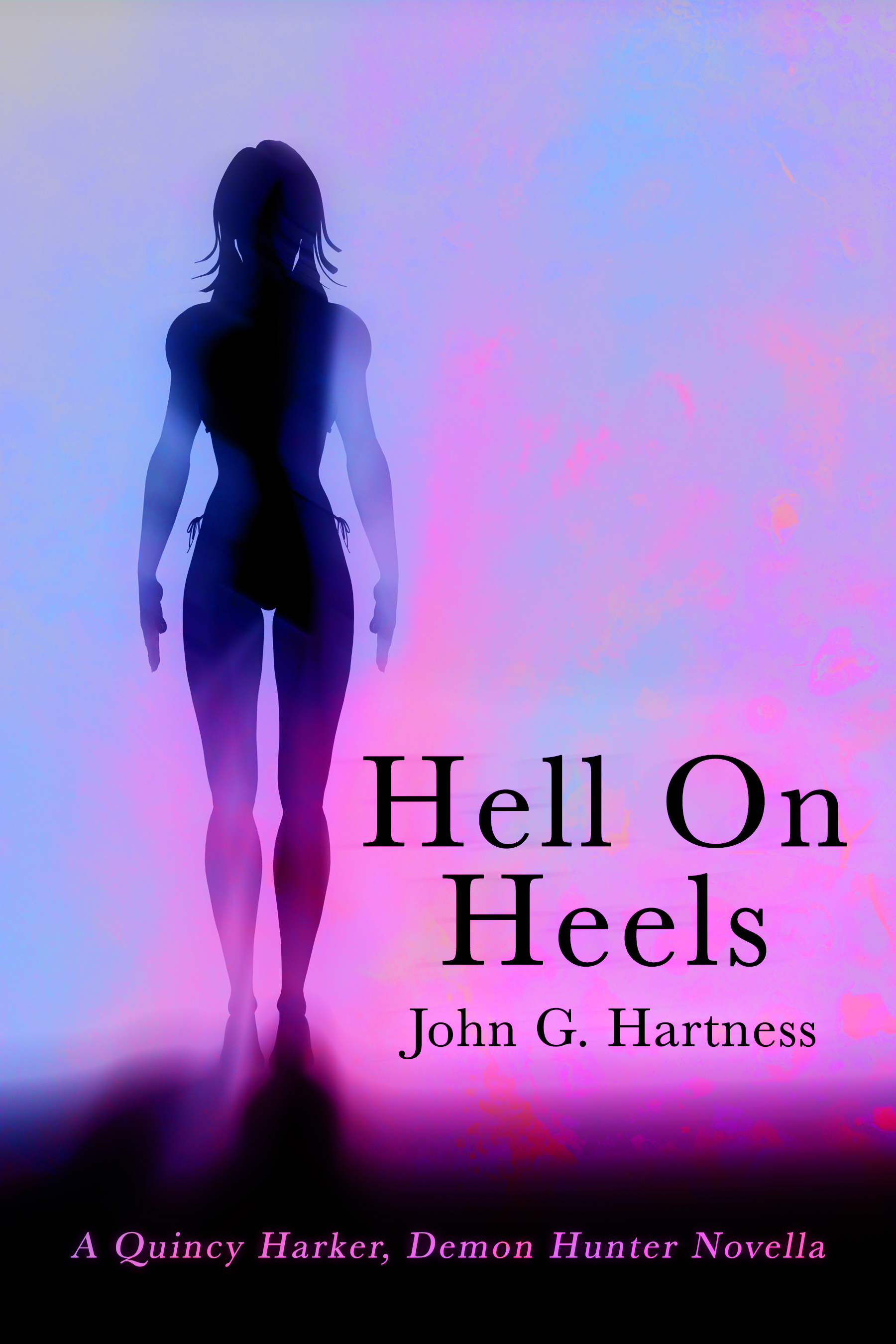
by john | Apr 26, 2016 | Business of publishing, Writing
Let’s be clear. I’ve never met Ros Barber, as far as I know and can recall. Since she’s an academic and poet living in England, I’m probably pretty safe saying we’ve never met, but there are these great things called airplanes that take people across the great big waters and there is a chance we’ve met and I just don’t remember it. But i really don’t think so. So I don’t know the lady. She’s probably a perfectly fine human being. I doubt she kicks puppies or takes away walkers from old people or tosses children’s ice cream cones on the ground or does anything generally despicable.
What she has done, as have many writers for The Guardian in the past, is written a clickbaity article decrying self-publishing as a viable career path for writers and generally insinuated that self-published writers are less talented, less skilled, and generally less writerly than other writers.
And people that are generally intelligent are taking her word as gospel, and that’s a shame. Because, like I said, these people are generally intelligent, but may have blinders on about some realities of the writing world today. So I decided to take a close look at Ms. Barber’s article and apply the filter of my own experiences to it. I don’t know if I’ll go point by point, because frankly, I may get bored and may have to go actually, you know, write at some point today, since that’s how I make my living and feed my family. I don’t have the backup of writing pissy articles for a website or teaching at a university to cover my living expenses, I have to do it through my fiction writing, unlike Ms. Barber.
Before I begin, I want to say this – self-publishing isn’t for everyone. For a lot of people it’s not the right choice for a variety of reasons. But to deride it as a viable career choice is frankly bullshit, and to make every self-published author out to be an unskilled writer with a lifestyle more akin to carnival barker than storyteller is unfair, uninformed, and makes you sound like an elitist assclown.
- “You Have to Forget Writing for a Living” – right out of the gate, Ms. Barber talks bout how much time is spent promoting a self-published book, or series of books. She jumps right into the deep end, talking about how self-pub writers spend 90% of their time on promotion, and only 10% of their time writing. Let’s look at my typical work day to provide an example of how much time in a day I spend on book promotion.
Wake Up – 7-8AM – I’m generally in front of my computer answering emails and eating breakfast by eight each morning. I spend the hours from 8-10 usually goofing off on Facebook, answering emails, putting out fires either with books in production, projects coming up from Falstaff Books, or just watching cat videos.
Write – 10-11AM – I usually shoot for about an hour of actual writing each morning. That gets me 1,000 words on the page in the morning, and that’s pretty decent.
More email/Facebook – 11AM-Noon – also frequently means editing something for Falstaff, doing a cover design, working on a book layout, working on a calendar of releases, confirming travel details, whatever.
Lunch – Noon-1PM – Suzy and I try to have lunch together, and I try to stop staring at the computer screen for an hour.
1PM – 2PM – Answer emails, finish up pre-lunch business
2PM – 3PM – Write – the goal is to get another 1,000 words in after lunch.
3PM – 5PM – Edit, work on covers, check in with my partners at Falstaff about their ongoing and upcoming projects, help Suzy lift a few heavy things out in the yard, maybe do a little prep work for a convention if there’s one coming up that weekend. Make sure I have inventory ready for upcoming conventions, and start looking at/booking conventions for 2017. We’ll call that 30 minutes of convention work “promotion.”
5PM – 6PM – Read for revisions and sometimes in the evenings I try to get another 1,000 words in.
I honestly spend perhaps half an hour each day on real promotion of my work, plus an hour on weekends setting up social media posts for the week. That equates to roughly 3.5 hours out of the let’s call it 50 hours each week that I work. That’s about 7% of my time spent promoting.
I try to write for two hours each day, and some days I get an extra hour, so we’ll guess that I write for about 12 out of the 50 hours I work. That’s 24% of my time spent writing.
What happens to the other 69% of my time? Well, 3-4 hours each day are spent working on one of three businesses I run – a publishing company, a lighting sales rep company, and a Magic card sales company. And I watch a lot of cat videos on the internet. So just like at your job, not everything I do in a day results in words on a page. Sometimes I write long blog posts.
2. “Self-Publishing can make you act like a fool” – So can being hired to write for The Guardian. Yes, lots of people behave like jackasses on social media. Let me introduce to a gentleman named Rob Gronkowski. Moving on.
3. “Gatekeepers are saving you from your own ego” – I had a lot of snarky responses about saving me from the ego of PhDs with accents, but deleted them because that’s not where I want to go. Let’s just say that agents and acquisitions editors are not the arbiters of taste or quality writing. They are looking to buy books that sell, not necessarily books that are brilliantly written. So the gatekeepers that will save you from your own ego? We call those readers. And if they don’t like a book, they won’t buy it. Or worse, they will, and they’ll leave savage reviews everywhere to save other readers from their pain. So yes, gatekeepers will save you from yourself, but not the gatekeepers you think.
4. “Good writers become good because they undertake an apprenticeship. Serving your apprenticeship is important. – In some ways I actually agree with this, although not at all with the feudalist in which it is phrased. You do need to learn to write before you self-publish a novel. And you can best learn to write by writing a lot of terrible shit that is unworthy of publication. And some of us do that by blogging for half a decade and writing 400+ semi-journalistic poker articles before we branch out into fiction. Some people just write a good book the first time. You don’t get to decide who’s good enough, or educated enough, or talented enough – the readers do. This is the core educational elitism that i take issue with. Just because you’re an award-winning poet with a PhD doesn’t mean you’re qualified to judge anything about my self-published work. I’m an award-winning poet with the word “Publisher” behind my name on my business cards, and I still don’t get to tell you anything more about the works of Christoper Marlowe than you get to tell me about computerized theatrical lighting control systems (unless you’re also an expert on those, which it doesn’t mention in your bio).
5. You can forget Hay Festival and the Booker – so can every genre fiction writer in the world. Stephen King and George R.R. Martin give not a single fuck about those prizes. And frankly, Pat Conroy did pretty well writing literary fiction without ever winning any of those awards. So write what you want, and fuck awards.
6. You risk looking like an amateur – only to elitist assclowns. Readers who see me at a table with Faith Hunter, Gail Martin, David Coe, A.J. Hartley or any of my other traditionally published friends can’t tell the difference between my self-published paperbacks and their traditionally published paperbacks. The only people who give a shit are writers, and mostly wannabe writers.
7. “70% of Nothing is Nothing” – True. You might not make any money as a self-published author. You might lay out a grand to get your book edited, get a decent cover, get it proofed and converted, and then maybe make less than a thousand dollars off the book. You might also get a $5,000 per book advance from a traditional publisher, give 15% of that to your agent, get your book published and on the shelves in local bookstores, then not sell worth a fuck and get dropped from your contract before book 3 in the series comes out. Then you’ve got $4,250 per book, a series you can’t finish, and years of your life you can’t get back when you could have been writing something else.
Or you could bust your ass and make a living. I do. I don’t make a glamorous living. I’m not living in a mansion, but I make my mortgage payments. I don’t drive a Mercedes, but my truck will be paid off this year. I don’t eat caviar, but I don’t miss any meals, either. So if you want it, it’s out there. But you have to want it. And you have to be willing to work harder than anyone else, because that’s what small business owners do. And if you don’t look at your writing career as being a small business owner, then you’re not ready to have a writing career, no matter how you plan to publish.
Writing is hard. Writing novels is hard. Selling books is hard, and anybody that tells you they’ve got a silver bullet for you is a fucking liar, and keep your hand on your wallet while you talk to them. But don’t shit on anybody else’s dream just because you can’t make a living at this. Don’t spout your barely-researched half-“truths” because you wanted to write poetry and literary fiction, but you were too scared to take the leap, so you got a job teaching “to fall back on.”
If you want to be a writer, be a fucking writer. if you want to encourage people to choose a career path you love, go for it. But don’t look in from the outside with no experience and tell the world that one path is the wrong path just because you’re afraid of looking stupid and trying it. If you don’t have to guts to jump, don’t stand at the bottom of the high dive platform and tell everyone on the ladder they’re stupid. Buy a ticket, sit in the stands, and applaud the bravery of others. Or suck it up and jump in the pool.
Rant over.
John G. Hartness is a teller of tales, a righter of wrong, defender of ladies’ virtues, and some people call him Maurice, for he speaks of the pompatus of love. He is also the author of the EPIC-Award-winning series The Black Knight Chronicles from Bell Bridge Books, the Bubba the Monster Hunter series of short stories and novellas, the Quincy Harker, Demon Hunter novella series, and the creator and co-editor of the Big Bad anthology series, among other projects.
In 2016, John teamed up with a pair of other publishing industry ne’er-do-wells and founded Falstaff Books, a small press dedicated to publishing the best of genre fictions “misfit toys.”
In his copious free time John enjoys long walks on the beach, rescuing kittens from trees and playing Magic: the Gathering.
For samples of John’s ridiculous sense of humor, check out these free ebooks – http://bit.ly/1U8eASF
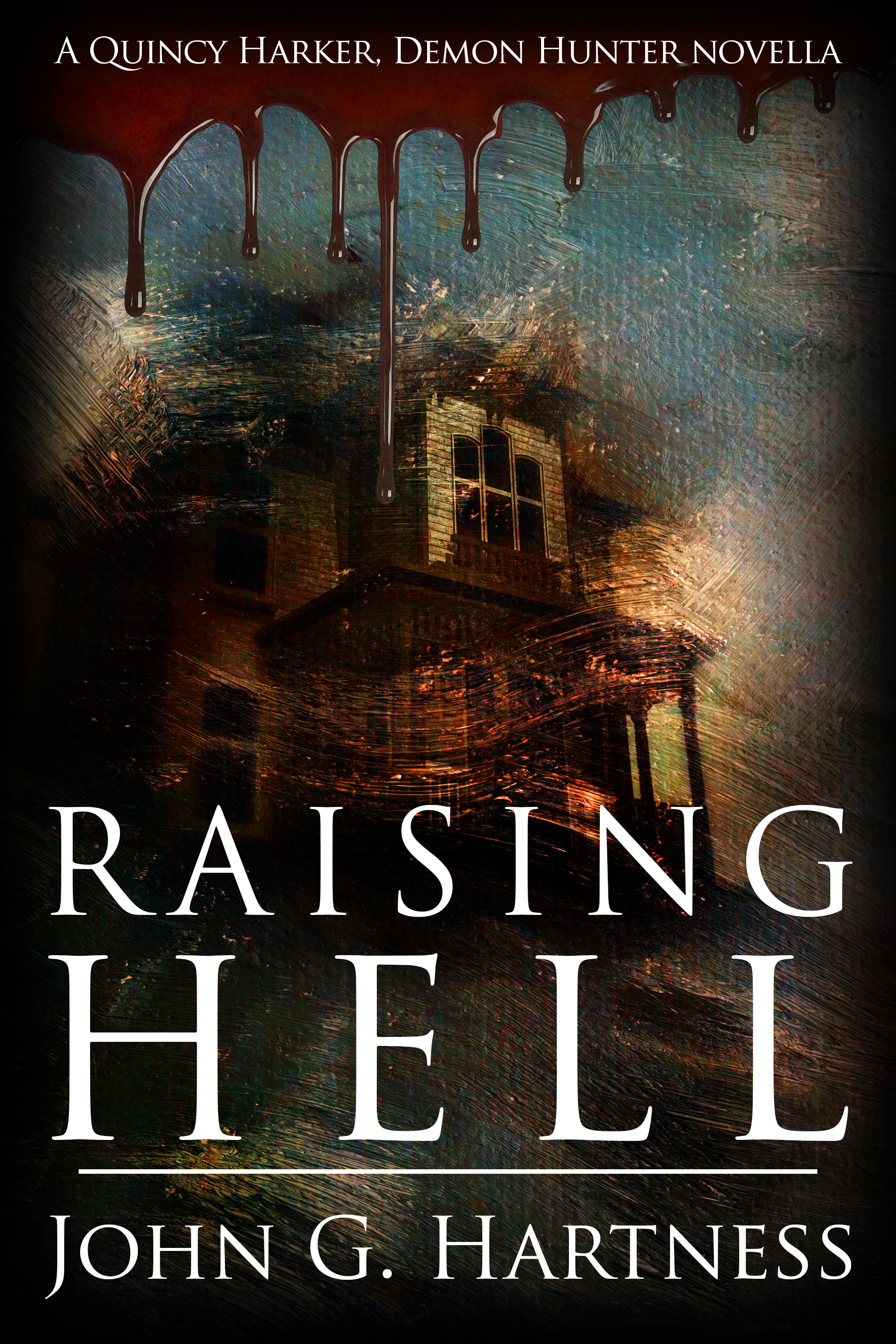
by john | Nov 1, 2015 | Business of publishing, Promos/Giveaways, Vampires, Writing
Facebook continues to dwindle as a way to connect with readers and bring new fans into the fold, so I’m going to continue pushing to grow my mailing list so that i can keep folks apprised of all my goings on. So here’s my new offer –
Sign up for my Mailing List and get Three FREE ebooks!
That’s right, all you have to do it follow this signup link, do what it tells you, and then in a few days I’ll send you a link where you can download a free ebook!
Then the next month you’ll get my newsletter, and it’ll have a code in it for another free ebook.
Then for Christmas, I’ll send out another code, and you’ll get another free ebook!
So you get THREE FREE EBOOKS if you sign up now!
The first book you get will be Knight (Un)Life, a collection of Black Knight short stories.
Then you’ll get a Bubba book.
Then you’ll get a Harker book for Christmas!
So if you haven’t joined my email list, sign up now and get THREE FREE EBOOKS! If you’ve already signed up, refer a friend and get my undying gratitude (plus the TWO FREE EBOOKS all my subscribers will get).
Remember, this deal ends after Christmas, and you’ve got a lot of shit to do between now and then, so sign up now!
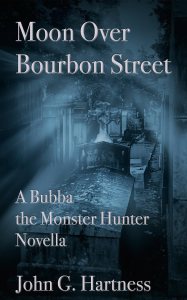
by john | Oct 28, 2015 | Writing
Here’s a quickie for you about what’s going on and what’s coming up soon.
First, a new Bubba the Monster Hunter Novella just dropped yesterday. Moon over Bourbon Street is the beginning of Season 3, and the beginning of an arc of novellas featuring everyone’s favorite monster hunter. Check it out at Amazon or wherever you buy ebooks! 
Then we’ve got the print edition of Grits, Guns & Glory, Bubba Season 2. It is FINALLY on the way, thanks to the layout talents of one Matthew J. Saunders, who helped me with the interiors and did a far nicer job than I ever could. So I’ll be using him or someone like him for future self-dubbed print projects. You’ll notice that GG&G has a different cover in print than it does in ebook, and that’s all about my Photoshop limitations. The cover I made for GG&G looked decent in thumbnail size on Amazon, and it looked okay in low-res, but it looked like flaming shit when I went hi-res for printing. So I took the image from Bad Moon Rising and built a new cover around that. Sometimes the best-laid plans, and all that. But here’s the print cover, and I think it turned out okay.
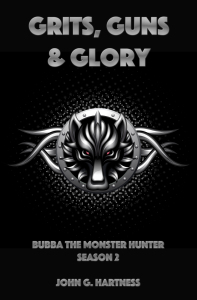
There’s a LOT brewing on the audiobook front. First, all five Black Knight Chronicles books are now available on Audible, so if you’d rather listen than read, you can keep up with the adventures of Jimmy and Greg. Also, Bubba Season 1 should be available on Audible in mere days, followed shortly by Raising Hell, Harker #1. Harker #2, Harker #3, Bubba Season 2, AND Knight (un)Life, a Black Knight short story collection, are all in production. So there should be a lot of audio available between now and the first of the year.
I’m hard at work on Black Knight #6, about 2/3 of the way through the book, and I’m working on a new Harker novella for next month, so stay tuned for more releases.

 Part 1 of this post got a lot of traffic, generated a fair amount of Facebook discussion, pissed some people off, and hopefully was useful to some of you. It also spawned my new podcast, Writing Rants, which is coming soon right to this here web space.
Part 1 of this post got a lot of traffic, generated a fair amount of Facebook discussion, pissed some people off, and hopefully was useful to some of you. It also spawned my new podcast, Writing Rants, which is coming soon right to this here web space.by Christina Henry. It’s a helluva book and hooked me from the beginning.
 Black Knight Chronicles #6 – Man in Black
Black Knight Chronicles #6 – Man in Black releases today! It’s my book birthday, and yesterday was my birth birthday! So if you want to show the love, go buy the book! If you don’t have $6 to buy Man in Black, check out one of my other books. The Black Knight Chronicles Omnibus
, collecting books 1-3, is on sale for $2.99.











